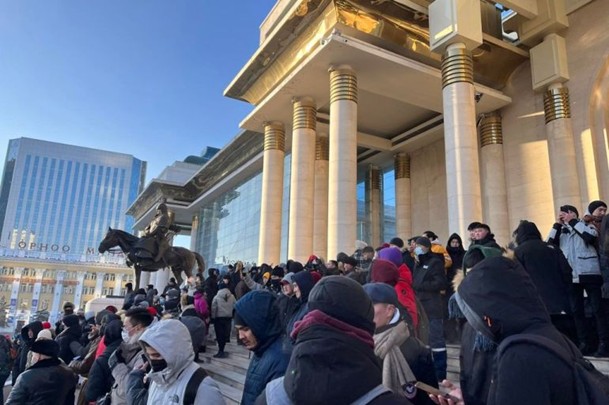
Afrasianet - A report published by the Russian Strategic Center for Cultures believes that the protests currently taking place in Mongolia may be a US attempt to strike Chinese and Russian interests in the country and strengthen US influence in the region.
Writer Vladimir Malyshev said in his report that the capital Ulaanbaatar has seen mass protests organized by the Freedom Alliance party to demand that the government resign over its failure to solve the problems of pollution, taxation, poverty and unemployment.
The coalition government includes Mongolia's two largest parties, the Mongolian People's Party and the Democratic Union, as well as the Labour Party, he said.
The U.S. plan is to divide the Mongolian elite, including the Democratic Union (PYD), the country's second-largest party, into two camps: a pro-Russian one, led by former President Khaltama Battulga, and a pro-U.S. president, led by former President Tsakhyagin Bigorj.
He also referred to the statement of Alexei Tsidenov, President of the Republic of Buryatia, in 2023 that "the United States is trying to carry out a coup in Mongolia according to the Ukrainian scenario."
Color revolution
There are parties in China who believe that the United States is working on a "color revolution" with the aim of bringing a new president loyal to it to power.
He referred to the anti-government protests that took place in the country in December 2022 after $1.8 billion in revenue disappeared from the sale of 6.5 million tons of Mongolian coal to China.
A number of observers suggested at the time that the protests were orchestrated by outside powers, especially as the United States seeks ways to contain Chinese and Russian influence in the region and the possibility that Mongolia will become a new fulcrum in implementing this strategy.
U.S. efforts to influence Ulaanbaatar have come through the signing of several bilateral agreements related to security and the establishment of a "comprehensive partnership" between the two countries in recent years, according to the report.
In the current demonstrations, the Freedom Alliance party expressed its dissatisfaction with the lack of progress by the government and parliament in resolving problems related to taxes and salaries, and stressed that it would not conclude agreements or dialogues with the government and that "protests will continue until the goal is achieved."
But he pointed out that the Mongolian economy, according to official data provided by the government, is witnessing a positive development, as it recorded a growth of 5% in 2024, cash reserves amounted to $ 5.1 billion, and the country's credit rating improved at the international level.
The government also increased all types of pensions provided by the Social Insurance Fund every year from 2018 to 2023 in line with the changing cost of living, and the minimum pension and military pension became about US$190.
This raises suspicions from parties that the protests in Mongolia are orchestrated by outside parties.
Chinese and Russian influence
China is Mongolia's major trading partner at present. According to a statement by Mongolia's National Bureau of Statistics, the bilateral trade volume with China from January to September amounted to $13 billion, accounting for 72.3 percent of the total foreign trade volume.
In 2022, Russian Deputy Minister of Economic Development Dmitry Volvach confirmed that the volume of joint trade exchange amounted to $ 2.6 billion, and Russian President Vladimir Putin visited the capital Ulaanbaatar in September last year.
In his recent visit to Beijing, Mongolian President Oknangen Khorlusukh stressed that Mongolia is a "bridge" between China and Russia, expressing hope to develop relations with Beijing in the fields of energy and others, according to the Chinese news site "Soho".
American influences
The United States is trying hard to limit Mongolian rapprochement with Russia and China, and as part of these efforts, the Mongolian government signed a cooperation agreement with NATO in 2012, under which Ulaanbaatar received "partner" status.
Vladimir Grayvoronsky, head of the Mongolia department at the Institute of Oriental Studies of the Russian Academy of Sciences, was quoted as saying that by strengthening ties with Ulaanbaatar Washington seeks to contain Chinese influence there, adding that the United States considers Mongolia a base for monitoring China, Russia and Central Asian countries.
According to the author, a number of military experts believe that Ulaanbaatar handed over its security system to Washington, giving the latter the opportunity to engage in military and biological activities in this country.
The Pentagon now controls the infrastructure created by the Soviet Union, including laboratory facilities, and Igor Nikulin, a microbiologist and former member of the United Nations Biological and Chemical Weapons Commission, asserts that all these laboratories are directed primarily against Russia, China and Iran.
Supplies from Mongolia could reduce the degree of U.S. dependence on mineral resources from China, after the latter imposed restrictions on the export of its rare earth elements to Washington.

